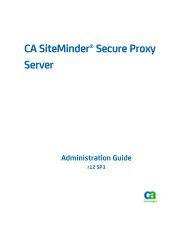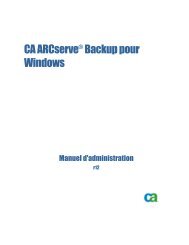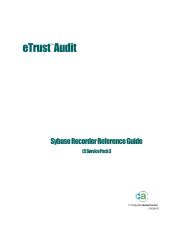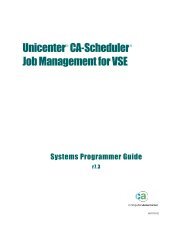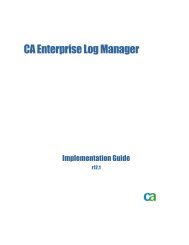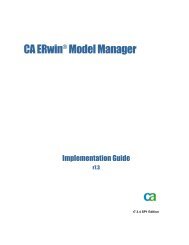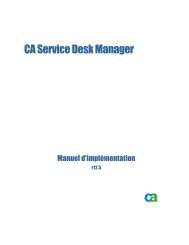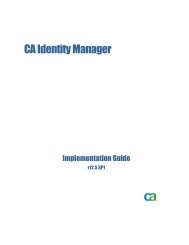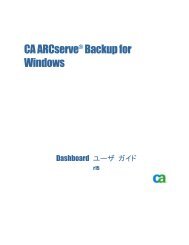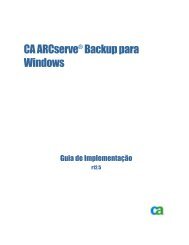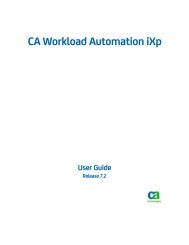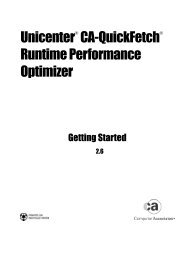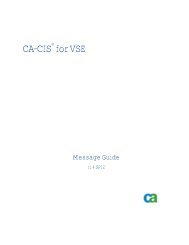Unicenter CA-Scheduler Job Management for VSE User Guide
Unicenter CA-Scheduler Job Management for VSE User Guide
Unicenter CA-Scheduler Job Management for VSE User Guide
Create successful ePaper yourself
Turn your PDF publications into a flip-book with our unique Google optimized e-Paper software.
3.9 Defining <strong>Job</strong>s<br />
■<br />
MAXIMUM TIMEs have been defined <strong>for</strong> the schedule as well as this job.<br />
The job's record sets limits on how long this one job should run, but the<br />
schedule's record limits how long the entire schedule can take.<br />
Descriptions of all five fields on this panel follows.<br />
AVG TIME<br />
EARLY TIME<br />
MUST TIMEs<br />
DEADLINE TIMEs<br />
MAXIMUM TIMEs<br />
Tracks how long the job takes <strong>for</strong> up to 16 reasons why<br />
it might be selected. AVG TIME on the job's record does<br />
not override the values <strong>for</strong> AVG TIME on the schedule's<br />
record because these fields describe two different things:<br />
how long an entire schedule or only one job usually<br />
takes to run. Instead, the AVG TIMEs you specify<br />
override the actual average run times derived from<br />
historical data.<br />
Allows you to specify different EARLIEST START TIMEs<br />
<strong>for</strong> each reason this job is selected. If you leave these<br />
fields blank, <strong>Unicenter</strong> <strong>CA</strong>-<strong>Scheduler</strong> uses the value on<br />
the job's base record every time the job is selected.<br />
Notice that a schedule's EARLY TIME must be reached<br />
be<strong>for</strong>e <strong>Unicenter</strong> <strong>CA</strong>-<strong>Scheduler</strong> considers submitting any<br />
of its jobs.<br />
Tell <strong>Unicenter</strong> <strong>CA</strong>-<strong>Scheduler</strong> to issue late messages if the<br />
job hasn't started by the time specified <strong>for</strong> each reason<br />
jobs can be selected. If you leave these fields blank,<br />
<strong>Unicenter</strong> <strong>CA</strong>-<strong>Scheduler</strong> uses the value <strong>for</strong> MUST<br />
START BY TIME on the job's base record instead.<br />
Tells <strong>Unicenter</strong> <strong>CA</strong>-<strong>Scheduler</strong> to issue late messages if<br />
this job isn't finished by the time specified. Specify<br />
values here if you want to define different deadlines <strong>for</strong><br />
each reason the job was selected. These values override<br />
the COMPLETION DEADLINE TIME you may have<br />
specified on the job base record. Notice that these<br />
deadlines apply to a specific job while those on schedule<br />
records define when all the jobs in that schedule must be<br />
completed.<br />
Sets limits on how long a job should run. If it takes<br />
longer, <strong>Unicenter</strong> <strong>CA</strong>-<strong>Scheduler</strong> will issue a late<br />
message. Specify values here if you want to define<br />
different durations <strong>for</strong> each reason the job was selected.<br />
These values override the MAXIMUM EXECUTION<br />
TIME specified on the job's base record. MAXIMUM<br />
TIME on job records define how long a job should take<br />
to run, but on schedule records, MAXIMUM TIME<br />
shows how long all the jobs in that schedule run.<br />
What happens if you define more than 16 reasons in a criteria statement? The<br />
times <strong>for</strong> any reasons beyond the 16th default to the values defined on the<br />
job's base record.<br />
Chapter 3. Maintaining the Database 3-81



